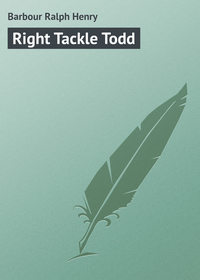 полная версия
полная версияThe Lilac Girl
"Oh, no, sir," replied Zephania, with a shocked, pitying expression. "I'd never do that. I'd clean each room separately, sir; sweep and wash up the floors and around the mop-board and—"
"Whatever way you think best," interrupted Wade. "I leave it all to you, Zephania, and I'm sure it will be done beautifully."
"Thank you, sir. Mother says I'm a real smart cleaner. Shall I get some more flowers in this vase, sir? This piece of lilac's dreadfully wilted."
"No, Zephania, just let that remain, please. The fact, is, that—that's a rather particular piece of lilac; something out of the common."
"Out of the common?" echoed Zephania, in faint surprise, surveying as much of the common as she could see through the window. "You don't mean our common?"
"No," answered Wade, gravely, "not our common. That piece of lilac, Zephania, is a clue; at least, I think it is. Do you know what a clue is?"
"Yes, sir. It's something you find that puts you on the trail of the murderer." Zephania eyed the lilac interestedly.
"Well, something of that sort. Only in this case there isn't any murderer."
"A thief?" asked Zephania, eagerly and hopefully.
"Not even a thief," laughed Wade. "Just—just somebody I want very much to find. I suppose, Zephania, you know about every one in the village, don't you?"
"Pretty nearly, I guess."
"Good. Now suppose you tell me something about my neighbors. Every one ought to know about his neighbors, eh?"
"Yes, sir. After you've been here some time, though, you'll know all about them."
"Yes, but the trouble is I don't want to wait that long. Now, for instance, who lives over there on my left; the square white house with the drab blinds?"
"Miss Cousins, sir. She's a maiden lady and has a great deal of money. They say she owns some of the railroad. She plays the organ in church, and—"
"Youngish, is she, with sort of wavy brown hair and—"
"No, sir," Zephania tittered, "Miss Cousins is kind of old and has real gray hair."
"Really? On my other side, then, who's my neighbor there? Or haven't I one?"
"Oh, yes, sir," answered Zephania, eagerly. "That's the Walton house, and that's—"
"The—what?" asked Wade, sitting up very suddenly in the green rep rocker.
"The Walton house, sir."
"Oh! Hum! And—er—who lives there, Zephania?"
"Miss Walton and Miss Mullett."
"What's this Miss—Miss Walton like? Is she rather stout with quite black hair, Zephania?"
"Oh, no, Mr. Herring! I guess you saw Mrs. Sampson, the dressmaker. She lives over there across the common, in the little yellowish house with the vines; see?"
"Yes, yes, I see. That's where Miss Sampson lives, eh? Well, well! But we were speaking about Miss Walton, weren't we?"
"Yes, sir. Miss Walton's a young lady and as pretty as—as—" Zephania's words failed her and she looked about apparently in search of a simile.
"Now let's see what you call pretty," said Wade. "What color is her hair?"
"It's brown."
"Oh, well, brown hair isn't uncommon."
"No, sir, but hers is kind of wavy and light and I don't believe she ever has to curl it."
"You don't tell me! And her eyes, now? I suppose they're brown too?"
"Blue, sir. She has beautiful eyes, Mr. Herring, just heavenly! Sometimes I think I'd just give almost anything if my eyes were like hers."
"Really? But you seem to have a very good pair of your own. Don't trouble you, do they?"
"They're black," said Zephania, cheerfully. "Black eyes aren't pretty."
"Oh, I wouldn't go as far as that," murmured Wade, politely.
"No, sir, but Miss Walton's are just as blue as—as the sky up there between those two little white clouds. She's awfully pretty, Mr. Herring."
"Complexion dark, I suppose."
"No, sir, not dark at all. It's real light. Some folks say she's too pale, but I don't think so. And sometimes she has just lots of pink in her cheeks, like—like a doll I have at home. Folks that think she's too pale ought to have seen her yesterday afternoon."
"Why is that?'"
"'Cause she was just pink all over," answered Zephania. "I took some eggs up to her house and just when I was coming out she came up on the porch. She looked like; she'd been running and her face was just as pink as—as that lamp-mat!"
The object in question was an excruciating magenta, but Wade let it pass.
"Yesterday was rather a warm day for running, too," observed Wade.
"Yes, sir, and I don't see what made her run, because she had been in the garden. Maybe a bee or a wasp—"
"How did you know she had been in the garden?"
"Why, 'cause she came from there. She hadn't ought to run like that in hot weather, and I told her so. I said 'Miss Eve'—What, sir?"
"Nothing," answered Wade, poking industriously at the tobacco in the bowl of his pipe. "You were saying—"
"I just told her, 'Miss Eve, you hadn't ought to overheat yourself like that, 'cause if you do you'll have a sunstroke.' There was a man over at the Center last summer who—"
"And what did she say?" asked Wade.
"She said she'd remember and not do it again. And then Miss Mullett came out and I went home."
"Who's Miss Mullett, Zephania?"
"She's Miss Walton's friend. They live there together in the Walton house every summer. Folks say Miss Mullett's very poor and Miss Walton looks after her."
"Young, is she?"
"Not so very. She's kind of middle-aged, I guess. She's real pleasant. Miss Walton thinks a lot of her."
"And they're here only in the summer?"
"Yes, sir. They come in June and stay until September. This is the third summer they've been here. Before that the house was empty for a long, long time; just like this one."
"Very interesting, Zephania. Thank you. Now don't let me keep you from your labors any longer."
"No, sir, but don't you want to hear about any one else?"
"Another time, thanks. We'll do it by degrees. If you tell me too much at once I shan't be able to remember it, you see."
"All right," answered Zephania, cheerfully. "Now I'll wash up the dishes."
After she had gone Wade sat for a long while in the green rep rocker, his eyes on the spray of lilac on the table and his unlighted pipe dangling from his mouth. From the kitchen came a loud clatter of dishes and pans and Zephania's voice raised in song:
"'We shall sleep, but not forever,There will be a glorious dawn;We shall meet to part, no, never,On the resurrection morn!'"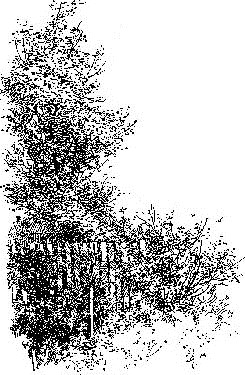
V
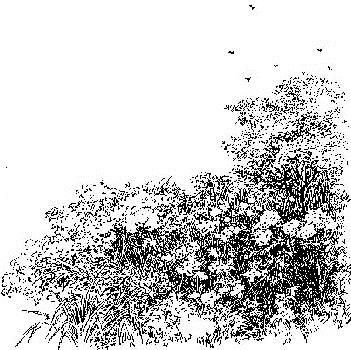
When one has spent six years prospecting and mining in Colorado and the Southwest one has usually ceased to be capable of surprise at any tricks Fate may spring. Nevertheless Wade was forced to wonder at the chain of events which had deposited him here in a green rep rocking chair in Eden Village. That the Western Slope Limited, two hours late and trying to make up time, should have had a hot-box and, perhaps for the first time in months, stopped at the top of Saddle Pass and presented Evelyn Walton to him was one of Fate's simpler vagaries; but that now, after five years, he should find himself beside her nearly two thousand miles from their first place of meeting was something to think about. First event and last were links in a closely-welded chain of circumstance. Looking back, he saw that one had followed the other as logically as night follows day. By a set of quite natural, unforced incidents Fate had achieved the amazing.
Wade no longer had any doubt as to the identity of the person who had looked in upon him through the window yesterday. The marvellous resemblance to the face he remembered so well, the dropped lilac spray were in themselves inconclusive, but the evidence of her name made the case clear and left but one verdict possible. Chance, Fate, Providence, what you will, had brought them together again.
It would, I realize, add interest to a dull narrative to say that Wade's heart beat suffocatingly with passionate longing, and that a wild desire to go to her possessed him. As a matter of fact his heart behaved itself quite normally and he showed no disposition to leave his chair. He was chiefly concerned with wondering whether she had recognized him, whether she even remembered him at all, and, if she did, what she thought of him for the idiotic way in which he had acted. Oh, he had been sincere enough at the moment, but, looked at calmly with the austere eyes of twenty-eight, his behavior on that occasion had been something—well, fierce! He groaned at the thought of it and almost wished that Fate had let things alone and spared him a second meeting. Of course there had been extenuating circumstances. She had stepped suddenly into his vision out of the twilight, a veritable vision of love and romance, and his heart, a boy's heart, starved and hungry for those things, had taken fire on the instant. He had—well, he had lost his head, to put it charitably. And after a fashion he had lost his heart as well. For a week he had dreamed of her at night and thought of her by day, had wondered and longed and built air castles. Doubtless, had he seen her again within the next year, the romance would have grown and flourished. But at the end of that first week they had found gold. The intoxication of success succeeded the intoxication of love, and in the busy months that followed the vision of Evelyn Walton's face visited him less and less frequently. At the end of a year she had become a pleasant memory, a memory that never failed to bring a half-sad, half-joyous little throb. That he had never actually forgotten her meant little, when you think how very tiny and unimportant a thing must be to utterly escape memory. He didn't want to forget her, for she represented the only sentimental episode that had come to him since school days. He had been much too busy to seek love affairs, and up in the mountains they don't lie in wait for one. Therefore at twenty-eight Wade Herrick was heart-whole. He wondered with a smile how long he was destined to remain so unless that same meddling Fate removed either him or Evelyn Walton from Eden Village.
Zephania went through the hall singing, on her way upstairs to inaugurate her war of extermination against dirt. Wade roused himself and lighted his pipe. After all, he had done nothing criminal and there were ninety-nine chances in a hundred that the girl wouldn't connect him for a moment with the astounding youth who had made violent love to her for an ecstatic five minutes on the top of Saddle Pass so many years ago. He got up and looked at himself in the old gold-framed mirror above the table.
"My boy," he muttered, "you're quite safe. You used to be fairly good looking then, if I do say it myself. But now look at you! You have day-laborer written all over you! Your hair—I wonder when and why you ever began to part it away down near your left ear. But that's easily changed. Your nose—well, you couldn't alter that much, and it's still fairly straight and respectable. But that scar on the cheek-bone doesn't help your looks a bit, my boy. Still, you mustn't kick about that, I reckon, for if that slice of rock had come along an inch or so farther to the right you'd have been tuerto now. Not that your eyes are anything to be stuck up about, though; they're neither brown nor green, nor any other recognized color; just a sort of mixture—like Pedro's estofados. Your mouth, now—you always had a homely sort of mouth, too big by far. And you were an idiot to shave off your mustache. You might let it grow again, now that you're where you could have it trimmed once in awhile, but I suppose it would take a month and look like a nail-brush in the meanwhile! And then there's your complexion, you poor ugly hombre. I remember when it was like anybody else's and there was pink in the cheeks. Look at it now! It's like a saddle-flap. And your hands!"
He viewed them disdainfully. They were immaculately clean and the nails were well tended, but two years of pick and shovel had broadened them, and at the base of each finger a calloused spot still remained. On the left hand the tip of one finger was missing and another was bent and disfigured. They were honorable scars, these, like the one on his cheek, but he looked at them disgustedly and finally shoved them out of sight in his pockets.
"No, don't you worry about her recognizing you," he said to the reflection in the mirror. "Even if she did she'd be ashamed to own it!"
Wade, however, was over-critical. Whatever might be said of the features individually, collectively they were distinctly pleasing. The impression one received was of a clean, straight-limbed, clear-eyed fellow, who, if he had worked with his hands, had won with his brain. He looked a little older than his twenty-eight years warranted, and a little taller than his scant five-feet-eleven proved. Above all, he appeared healthful, alert, capable, and kindly. He made friends at sight with men, children, and dogs and wore his friendships as easily as he wore his clothes. The West puts an indefinable stamp on a man, and Wade had it. When presently he donned a cloth cap, torn from the confused depths of his valise, and passed out of doors he walked like a man who was used to covering long distances afoot, and with a certain swing of his broad shoulders that suggested a jovial egotism. And as he made his way through the orchard and into the meadow beyond his mind was still busy with Evelyn Walton.
Of course he would meet her sooner or later; he was bound to unless he pulled up stakes and hiked out at once. And he didn't want to do that. He was enjoying a totally new sensation, that of householder. And he liked Eden Village with its big elms and shaded roads, its wide meadows and encircling green hills. It was all new and delightful after the bare, primeval grandeur of the mountains. Besides, and Wade laughed softly to himself, when all was said and done, he really wanted to meet her. The prospect brought a flutter to his heart and a pleasant excitement to his mind. He would probably fall in love with her again, but there was no harm in that since he would be off before the disease could strike in very deep.
He had reached the stone wall dividing his property from the land beyond. At a little distance a brook bubbled along its sunken course. Bushes, ferns, and here and there a small tree lined its banks, and Wade could follow its journeying with his eyes for some distance. He vaulted the wall and crossed to the brook, examining it with the curiosity of a fisherman. It was rather disappointing. He didn't believe any self-respecting fish would deign to inhabit such meagre quarters. But it was a fascinating little stream for all of that, and it sang and purled and had such a jolly good time all to itself that unconsciously Wade fell into step with it, so to speak, and kept it company through the meadow. Swallows darted above him and sparrows took flight before him in mild alarm. Once he disturbed a catbird on her nest and she flew circling about his head, scolding harshly.
What had he been thinking about a moment before? Oh, yes, he had been considering the danger of overdoing the falling in love business. Well, there was a proverb about its being better to have loved and lost than never to have loved at all. Wade agreed with those sentiments. To go head over ears in love with some nice girl like—well, like Evelyn Walton—even if you got turned down was better than nothing. Of course the girl mustn't know. It wasn't a part of his plan to worry her any. He was quite certain that if he was careful she needn't even guess his sentiments. Perhaps—well, what if it was nonsense? A fellow could think nonsense if he wanted to, couldn't he, on a day like this? Perhaps she might care for him enough to marry him! There wasn't any reason why he shouldn't marry. He had plenty of money and would have more; he could give the woman that married him about as much as the next man. She could have a house in New York if she wanted it! And servants and—and motors and—all the things a woman usually wants. Of course he didn't want to be married for his money, but—well, he wondered whether it would help if he managed to convey the idea that he was pretty well off, that he owned more than a controlling interest in one of the richest gold mines in Colorado. Undoubtedly there were girls who would jump at the chance to marry the principal owner of a mine like the—
He stopped with a gasp.
Great Scott! she mustn't hear the name of that mine! At least, not unless things turned out as they never could turn out. He groaned. He would have to watch himself every minute when he was with her or he would be blurting it out!
He found himself confronted by a fence, beyond which a wooded hill sloped upward. Should he return the way he had come, or—no, he could commit trespass on somebody's wheat field and so in all probability reach the highway. Five minutes later he found himself on the road and started back towards the cottage. He rather hoped that Miss Walton would not be on her front porch as he went by. He wasn't quite ready yet to show himself. It was a good ten minutes' walk to the end of the common, but he was so busy with his thoughts that he paid little attention to time or distance. He only came to himself when he suddenly found the lilac hedge beside him and the gate hospitably open. He walked up the steps, dimly conscious that his cottage looked this morning far less disreputable than it had seemed yesterday, and tried the front door. He didn't remember whether he had locked it last night. But evidently he had not, for it swung open and he found himself staring blankly into a pair of very lovely and much surprised blue eyes.
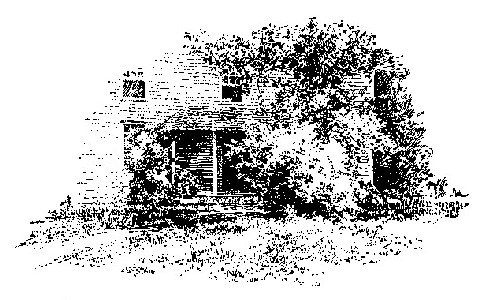
VI
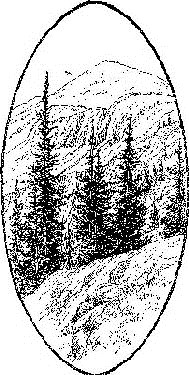
Time passed.
Somewhere about the house a canary twittered softly. Evelyn Walton, arrested on the sitting room threshold, a fold of the light portière clasped in one hand, gazed at the intruder. Wade, frozen to immobility just inside the door, one hand still grasping the knob, gazed at the girl. His mind was a blank. His lips moved mechanically, but no words issued from them. It seemed to him that whole minutes had passed, although in reality the old-fashioned clock at the end of the hall had ticked not more than thrice. He felt the color surging into his face, and at last sheer desperation loosened his tongue.
"Is there anything I can do—" he began.
But at the very same moment Evelyn Walton's power of speech returned likewise, and—
"You wished to see—some one?" she inquired.
As they spoke absolutely together neither heard the other's question and each silently awaited an answer.
"Tick … tock" said the old clock, sleepily.
Wade's gaze wandered. He wondered whether it would be unforgivable to dash quickly out and slam the door behind him. But in the next breath escape was forgotten and he was looking about him in sheer amazement. Here was his hallway, but no longer empty. A shield-backed chair stood beside the parlor door. A settle ran along the wall beyond. A pink-cheeked moon leered at him from the top of a tall clock. Bewilderedly he looked toward the sitting-room. There, too, everything was changed. The floor was painted gray. Rugs took the place of carpet. Gauzy lace curtains hung at the windows. A canary in a gilt cage sung above an open window. Oh, plainly he was bewitched or the world was topsy-turvy! The look he turned on the girl was so helpless, so entreating that her face, which had begun to set coldly, softened instantly. The hand clasping the curtain fold fell to her side and she took a step toward him.
"Can I help you?" she asked, kindly.
Wade passed a hand over his eyes.
"I don't know," he murmured. "Will you please tell me where I am?"
"You're in my house. I am Miss Walton."
"Your house? Then—then where is mine, please?" he asked, helplessly.
"Just beyond here; the next one."
"Oh!" he said. He sought for words with which to explain the situation, but found none. He backed out, tripped slightly over the sill and found himself on the top step. He dared one more look into the girl's amused and sympathetic face and then turned and fled precipitately. At the gate he brushed against some one, muttered an apology, and plunged through. Evelyn Walton, following his course of flight from the doorway, laughed softly. Miss Caroline Mullett, standing on tiptoe in the middle of the path, strove to see over the hedge, and, failing, turned to the girl with breathless curiosity.

"YOUR HOUSE? THEN—THEN WHERE IS MINE, PLEASE?"
"Why, Eve, who was that?"
"He didn't leave his card, dear," replied Eve, with a gurgle of suppressed laughter, "but there is every reason to believe that his name is Herrick."
"The gentleman who has taken the next house? And what did he want? He seemed in such a hurry, and so very much excited! You don't think, do you, that he is going to have a sunstroke? His face was extremely congested."
"No, dear," replied Eve, as she followed Miss Mullett into the sitting-room, "I don't think he's in danger of sunstroke. You're getting to be quite as bad as Zephania on that subject. The fact is, dear, that the ensanguined condition of Mr. Herrick's face was due to his having mistaken our humble abode for his."
"My dear! How embarrassing!"
"So he seemed to think," laughed Evelyn.
"But I can quite understand it," continued Miss Mullett, laying aside her hat and smoothing down her hair. Miss Mullett's hair was somewhat of the shade of beech leaves in fall and was not as thick as it had once been. She wore it parted in the middle and combed straight down over the tips of her ears. Such severe framing emphasized the gentleness of her face. "You know yourself, Eve dear, that the first summer we were here we often found ourselves entering the wrong gate. The houses are as much alike as two peas."
"I know. But, oh, Carrie, if you could have seen his expression when it dawned on him that he was in the wrong house! It's too bad to laugh at him, but I just have to."
"I hope you didn't laugh while he was here," said Miss Mullett, anxiously.
"I'm afraid I did—just a little," replied Eve, contritely. "But I don't think he saw it. He was too—too bewildered and horrified, and terribly embarrassed. I really pitied him. I don't think I ought to pity him, either, for he gave me quite a fright when he opened the front door and walked in just as though he'd come to murder us all."
"Poor man!" sighed Miss Mullett. "He must be feeling awfully about it. And—and didn't you think him exceedingly nice looking? So big and—and manly!"
"Manly?" laughed Eve. "He looked to me more like a very small boy discovered in the preserve closet!"
"Of course, but I'm afraid you were a little—oh, the least little bit unfeeling, dear."
"Perhaps I was," owned Eve, thoughtfully. "I shouldn't want him to think me—impolite."
"No indeed! Do you think he will call?"
"After this morning? My dear Carrie, did he look to you like a man coming to call?"
"But in a day or two, perhaps? Don't you think that it is possibly our duty to convey to him in some delicate manner that he—that we—that his mistake was quite natural—"
"We might put a personal in the Tottingham Courier. 'If the gentleman who inadvertently called at The Cedars on Tuesday morning will return, no questions will be asked and all will be forgiven.' How would that do?"
"I'm afraid he would never see the paper unless we lent him our copy," replied Miss Mullett, with a smile. "But surely we might convey by our manner when meeting him on the street that we would be pleased to make his acquaintance?"
"Why, Caroline Mullett!" gasped Eve, in mock astonishment. "What kind of behavior is that for two respectable maiden ladies?"
"My dear, I'm an old maid, I know, but you're not. And if you think for a moment that I'm going to sit here and twiddle my thumbs while there's a nice-looking bachelor in the next house, you're very much mistaken. Dear knows, Eve, I love Eden Village from end to end, but I never heard of an Eden yet that wasn't better for having a man in it!"









